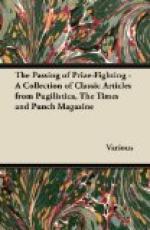Let us turn then to the younger PITT. I have read somewhere of the younger PITT that he cared more for power than for measures, and was ready to sacrifice great causes with which he had sincerely sympathised rather than raise an opposition that might imperil his ascendency. That is just the kind of nasty and long-winded thing that anybody might say about anybody. It was by disregarding this kind of criticism that the younger PITT kept on being younger. But apart from this, does Mr. LLOYD GEORGE quote HORACE in the House? Never, thank goodness. How many times did WILLIAM PITT cross the English Channel? Only once in his whole life. That settles it.
The predominant note—I may almost say the keynote—of the PRIME MINISTER’S character is rather a personal magnetism such as has never been exercised by any statesman before or after. When he rises to speak in the House all eyes are riveted on him as though with a vice until he has finished speaking. Even when he has finished they sometimes have to be removed by the Serjeant-at-Arms with a chisel. His speeches have the moral fervour and intensity of one of the Minor Prophets—NAHUM or AMOS, in the opinion of some critics, though I personally incline to MALACHI or HABAKKUK. This personal magnetism which Mr. LLOYD GEORGE radiates in the House he radiates no less in 10, Downing Street, where a special radiatorium has been added to the breakfast-room to radiate it. Imagine an April morning, a kingfisher on a woody stream, poplar-leaves in the wind, a shower of sugar shaken suddenly from a sifter, and you have the man.
It has been said that Mr. LLOYD GEORGE has quarrelled with some of his nearest friends; but this again is a thing that might happen to anybody. Mr. LLOYD GEORGE may have had certain slight differences of opinion with Lord NORTHCLIFFE, but what about HENRY VIII. and WOLSEY? and HENRY V. and Falstaff? and HENRY II. and THOMAS A BECKET?




